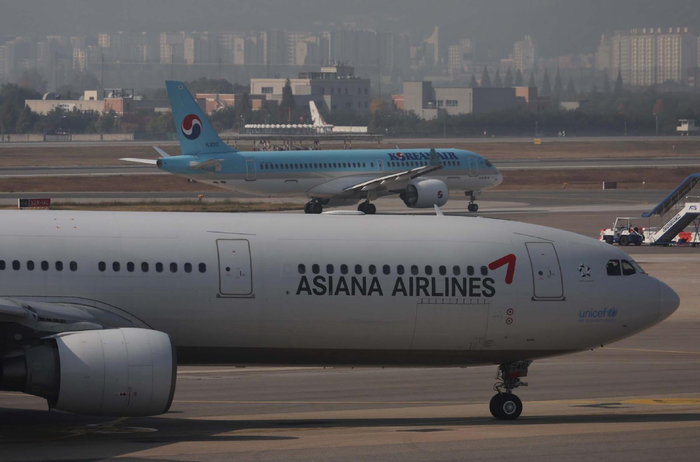 사진 확대 (Han Joo-hyung)
사진 확대 (Han Joo-hyung)
The popular Japan-bound routes operated by Asiana Airlines Inc., including those from Incheon International Airport to Osaka and Fukuoka, are likely to be redistributed to low-cost carriers (LCCs) from both South Korea and Japan.
The move comes as part of antitrust measures imposed by Japanese authorities ahead of the Korean Air Lines Co.–Asiana merger scheduled for late next year.
According to industry sources on Wednesday, three major routes currently operated by Korean Air and Asiana will be reassigned by July.
This follows the Japan Fair Trade Commission’s (JFTC) corrective order issued last year to prevent monopoly concerns stemming from the merger.
Each route already has a designated successor airline with first-refusal rights. Business plans will be submitted, and slot transfer agreements will be finalized by the end of July.
Actual operations are expected to begin on October 26, coinciding with the start of the winter flight schedule.
The term slot refers to the time window an airline is authorized to take off or land at an airport.
Under the redistribution plan, three high-traffic routes—Incheon–Osaka (Kansai), Incheon–Fukuoka, and Busan–Sapporo—will see most of their current slots reallocated to substitute carriers.
Specifically, Peach Aviation, Japan’s first LCC, is likely to take over three of Asiana’s four daily slots on the Incheon–Osaka route.
The route saw more than 4.4 million passengers last year, making it Korea’s busiest international route, with average load factors nearing 90 percent.
Meanwhile, Korea‘s Eastar Jet will acquire two of Asiana’s three daily flights on the Incheon–Fukuoka route, which handled about 3.38 million passengers in 2024.
Once the transition is complete, Asiana will be left with only one daily flight for each of the two routes.
Industry observers say the reassignment is a blow to Asiana, given that these two routes alone served over 1.08 million passengers last year. Many in the domestic LCC industry express disappointment that a key route like Incheon–Osaka will be awarded to a Japanese carrier.
“It’s regrettable that Korea’s transport authorities didn’t push harder to secure these routes for local LCCs,” said an industry insider. “The JFTC made its selection based on existing market share and other internal criteria.”
By Jeong Ji-seong and Minu Kim
[ⓒ Pulse by Maeil Business News Korea & mk.co.kr, All rights reserved]


AloJapan.com